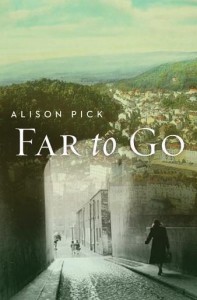August 14, 2010
Far to Go by Alison Pick
 Alison Pick doesn’t just take on history in her latest novel Far to Go, but she takes on what it is to take on history– can the fragments of history be turned into fiction or fact, and how much truth should we expect of either?
Alison Pick doesn’t just take on history in her latest novel Far to Go, but she takes on what it is to take on history– can the fragments of history be turned into fiction or fact, and how much truth should we expect of either?
Ostensibly, Far to Go is the story of the Bauer family, secular Jews living in the Czech Sudetenland when Hitler annexes the region in 1938. Told from the perspective of their Nanny, Marta, the novel follows the family to Prague where they go to escape Nazi persecution, and recounts the anti-semitism that rises in Czechoslovakia so that the Bauers have nowhere left to flee to. Having been reluctant to leave their home, where Pavel Bauer is an affluent factory owner, a patriotic Czech, and respected throughout their community with his wife Annaliese, it becomes too late for them to receive the exit visas necessary to get out of the country, so they decide their only option is to send their young son to safety through the Kindertransport, which placed children from Nazi-occupied countries with families in Britain in 1938 and 1939.
Marta’s point of view provides an interesting perspective on the family, as she does not take for granted her loyalty to them. Though the Bauers have been good employers, her life is tied up with theirs in uncomfortable ways, and the tide of anti-semitism sweeping the country is difficult to avoid altogether. Her loyalty to their son Pepik, however, is never questioned, and Pick has created a fascinating dynamic between a mother-figure who is closer to the son than his mother is. The story of Pepik’s departure and his subsequent experiences (from his own point of view) are heartbreaking, and the plot hangs on many twists that are artfully constructed.
In places, however, the narrative seems artificial, clunky with exposition in that way that historical fiction can sometimes be, but then Pick frames the story with a present-day narrator who suggests all is not what it seems with the Bauers, creating enormous suspense as the novel progresses. These sections are also written in a tremendously powerful prose that suggests the novel is in the end of a writer who knows exactly what she is doing, that we should put our trust in her and let the pieces come together (and indeed they do– this is a novel I flew through). Pieces which include letters and fragments of letters from characters in the story, filed as historical documents noting the writers’ deaths in Nazi concentration camps.
“I wish this were a happy story,” the novel begins, “A story to make you doubt and despair, and then have your hopes redeemed so you could believe again, at the last minute, in the essential goodness of the world around us and the people in it.” Laying all the cards on the table, such a novel this isn’t, but also (and notably) there is nothing manipulative about how Pick uses her subject matter either. Truly, parts of the book are devastating, but the story leaves its reader with far more than just emotion, evoking intriguing questions about history and truth (and loneliness, and memory, and human kindness). Far to Go serves as a testament to the power of story, to the importance of historical record, and a tribute to the amazing power of art, and what it can render from fragments.






Great review! I still have to read this. Anansi sent me a copy as well but I’m playing catch up with other books I’ve been sent. Still, your review has persuaded me to move the book up in my to-read list. 🙂
I read Alison Pick’s first novel and have been wanting to read this. Thank you for the review. I will stop procrastinating and buy a copy.